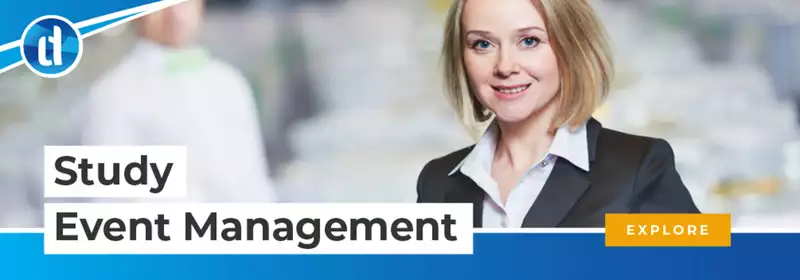Event Planners are confident individuals who use their industry savvy and imaginative thinking skills to make visions a reality. They are ambitious and meticulously minded. With a vested interest in both the nitty-gritty details and the creative big picture of the events they plan.
To be a successful Event Planner requires the drive to achieve the unachievable on a daily basis. The word ‘impossible’ isn’t in your vocabulary. You’ll think outside the box and be resourceful when it comes to delivering even the most outlandish of client requests.
This is a career path for people who love to be challenged. If that motivates you, then it’s incredibly rewarding seeing your work unfold before you.
As events become increasingly ambitious and complex, the need for skilled Event Planners rises. Whether it’s a wedding, product launch or music festival, each client wants theirs to be better than the rest. As an Event Planner, it’s up to you to bring that vision to life, on time and under budget.
If you do so successfully, you’ll be rewarded with a career path offering ample progression and earning potential. More experienced Event Planners can expect to earn up to £43,000 each year. With Senior Directors of Events taking home over £100,000.
But to become an Event Planner takes a combination of skills, desirable traits, knowledge and experience. There’s no set path into the role, but you’ll need to tick certain boxes to be considered.
Read on to learn what you’ll need to become an Event Planner.

Duties and Traits
Your duties will vary depending on the clients you work with and the type of event. But generally, you can expect to perform tasks along the lines of the below:
- Meeting with clients and discussing ideas
- Brainstorming event themes and concepts
- Helping clients determine their goals and vision
- Researching and scouting venues, presenting the most appropriate options for consideration
- Sourcing potential suppliers such as caterers and arranging samples for the client to try
- Working with clients to determine the layout of the venue
- Locking in and detailing comprehensive event plans approved by the client
- Booking the required products and services of third-party providers and entertainers
- Overseeing Event Managers in their organisation of the event, or taking a more active role in this as required
- Ongoing organisation and problem-solving as required
To perform these duties effectively, you’ll need to be on your A-game. Juggling multiple tasks at once and making sure everything aligns seamlessly on the day.
The most important skills you’ll need to demonstrate to employers are:
- That you can manage your time, be organised and punctual
- You’re outgoing and self-confident
- You can handle demanding clients
- Leadership and delegation abilities
- The ability to be self-sufficient and work autonomously
- Excellent communication and negotiation skills
- You’ve got a creative mind and can think on your feet
- You’re resourceful, can network easily and build beneficial relationships
- You can work with strict deadlines and tight budgets
- Happy to work the hours required to get the job done
- Will go above and beyond to deliver on the brief
- Can remain strong, calm and level-headed in times of pressure and uncertainty
Yours is the mind that sets the scope of the event and brings together all the critical moving parts. You’ll need to be switched on at all times, adapting and adjusting to the situation as it evolves.

Get Experience
You will need experience to become an Event Planner. So one key thing you can do is build a portfolio to prove your skills and abilities.
Aside from hands-on event work, the desirable traits of Event Planners are required in many other scenarios. You can demonstrate your competence by drawing on the skills you’ve used in other walks of life. Consider the transferrable skills you’ve gained in current and previous roles, hobbies and activities. Use these to start building a portfolio that showcases your diversified experience. Proving to employers that you possess the skillset they’re after.
There are a number of ways to gain the necessary hands-on experience needed. You can volunteer your services to charities, businesses or organisations, offering help with any part of planning they might need.
Otherwise, you could pursue an internship which is an excellent way to get to know how things work. You’ll typically shadow a seasoned Event Planner, so you’ll see first-hand what’s involved. Plus, it’s a great way to connect and meet key people.
Make sure to get references and referrals, along with images of the events you help with. This can all be added to your portfolio to bulk up your experience.

Get Connected
An Event Planner has a network of vendors, suppliers and contacts to call on for their client needs. So, one of the best things you can do to get started in the business is to start networking.
Get yourself out there and attend events for yourself, striking up any opportunity to meet and mingle with the organisers. They often allocate time to speak with event goers, answer questions or offer one-to-one meetings. By attending and showing enthusiasm, you can start to become familiar with influential people in the industry. Take copies of your CV with you, so you’re ready if someone shows interest in you.
It might be daunting initially, but networking is something you’ll need to get comfortable with quickly.
Another great way to build connections, identify opportunities and stay on top of event industry trends is through social media. Follow the event companies and Event Planners that are doing great things in the industry. Commenting on their work and initiating relevant conversations where appropriate. If you comment with genuine flattery or valuable input, they’re likely to take notice.
Jobs are often posted directly to a company’s feed before they are advertised on job boards. Giving you a head start when applying and hopefully getting you noticed early in the recruitment process.
You could also set up your own event planning feed. Where you share inspirational images and content from others in the industry. This helps to show what your style is and the values you align yourself with. Which can be great for employers to go off when they are assessing how motivated you are by the industry.

Get Qualified
You don’t necessarily need a degree or qualifications to become an Event Planner. But they can certainly help you get noticed and get hired.
Through studying an industry-specific course you’ll understand the business and the role of the Event Planner in detail. Differentiating yourself from the many others applying for the position.
Whether you want to specialise in weddings, other events or both, you can get the skills you need online.
Making your first step into a professional position much easier and evidencing your knowledge to employers. By investing in your education, you’re more likely to secure roles and position yourself for success in your career.
Get closer to your new career as an Event Planner by studying with learndirect. A leading UK distance learning provider with many online event courses to help you in your career.
Click to view them in more detail below.



















